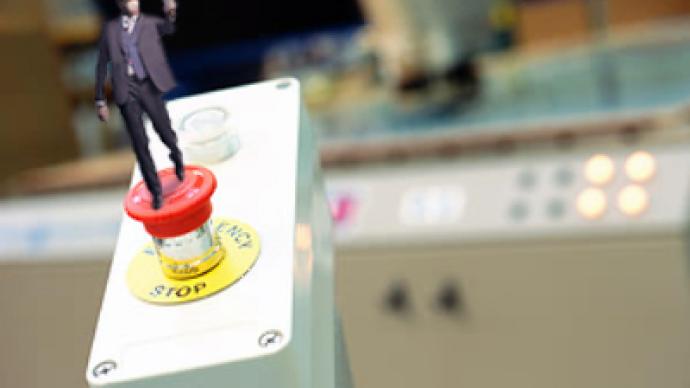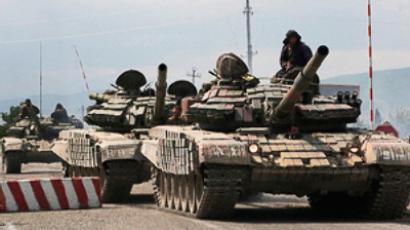Will Obama have Georgia on his mind in Moscow?

The 5-day Georgian war in August marked the biggest deterioration in relations between Moscow and Washington in recent memory. How will Obama dance around this red button issue in the Russian capital?
One year ago, President-elect Barack Obama was kicking around the idea of traveling to the southern U.S. state of Georgia to bolster the Democratic ticket there. Today, there is a whole new Georgia on Obama’s political radar and political observers are anticipating the American president’s arrival in Tbilisi following his Moscow visit (It seems they will have to settle for Vice President Joe Biden’s trip to Georgia and Ukraine, scheduled for July 20-24th).
Almost one year after Georgia and Russia descended into five days of hell, the US continues to make noise about the tiny yet proud Caucasian state. Although the rhetoric has calmed down dramatically, especially since the Republicans left the White House and Georgian President Mikhail Saakashvili got a domestic and international dressing down, the issue continues to hang in the air like a whiff of grapeshot.
‘Can’t get Georgia off my mind…’
On the eve of Obama’s visit to Moscow, Russia will be wrapping up a massive military exercise in the North Caucasus, codenamed ‘Kavkaz-2009,’ which showcases 200 battle tanks, 450 armored vehicles, 8,500 personnel and an assortment of artillery systems.
Interfax quoted an unnamed “senior official” from the Russian general staff who said that the large-scale military exercises on the Georgian border would serve to “cool the fantasies of some hawks” in Tbilisi.
Georgian Deputy Foreign Minister, Alexander Nalbandov, shot back that the military exercises constituted “a very dangerous provocation.”
“Holding of such maneuvers against the background of an explosive situation will only contribute to further tensions,” Nalbandov added.
The Georgian Minister failed to mention the NATO military exercises – composed of 1,000 personnel – that were held in early May on Georgian territory under the cloud of a failed military coup that shook Saakashvili’s wobbly pedestal of power to the very foundation.
Russian envoy to NATO, Dmitry Rogozin, said the Cold War military alliance would be better off holding their maneuvers “in a madhouse” than in a country where the troops were “rioting against their own president.”
But all is certainly not gloom and doom between Moscow and Tbilisi. At the time of this writing (July 1), negotiators from Georgia, Russia, United States, Abkhazia and South Ossetia are meeting in Geneva for the sixth round of peace talks. Although the meeting remains tense, one senior EU diplomat, who spoke on condition of anonymity due to her participation in the assembly, told RT “for the most part, the dust has settled from the war and the participants are talking more realistically about creating some sort of an agreeable peace.”
Playing to the Home Crowd
US President Barack Obama, even at this early stage of his presidential tenure, cannot afford to ignore the Republican opposition, tortured as it is by being forced to watch Obama dismantle their eight-year empire of fear.
Although Obama is not moving as quickly as many Democrats would like, he has rocked the Republican boat by harshly outlawing (once again) the use of torture against enemy combatants, as well as stating his willingness to sit down and talk with ‘the enemy’ – a dramatic departure from the ‘shoot first ask questions later’ approach of the Bush administration. So the Republicans are sitting on the edge of their seats, waiting like hungry sharks for Obama to commit a foreign policy error.
Many Western observers have become sluggishly comfortable with the theory that Russia, which lost 12 peacekeepers in a brazen sneak attack by Georgian forces on the night of August 7, 2008, acted with “disproportionate force” when the Russian Army took the battle to the suburbs of Tbilisi where the attacks commenced.
Apparently, some western commentators believe that, had their own people been confronted with a similar national emergency, their political and military leaders would have acted with more grace. They would have retreated under the threat, turned a blind eye to the geographical origins of the attacks, and ignored the political ramifications at home for such behavior. A cursory review of western history immediately exposes the lie of such magnanimous self-delusiveness. But the job of many think tanks and pundits is not to produce truth, but rather steer and control public opinion with their own crafted version of events. Thus, many in the West still believe Russia was to blame for the war – full stop. That is the reason Moscow may have to suffer through a brief Obama lecture entitled something like “respecting the sovereignty of your neighbors” or "how to give up imperial ambitions in 12 easy steps" regardless as to who really fired the first shot.
For the neoconservatives under George W. Bush, the tiny Caucasian nation represented Washington’s “Georgia Project,” as Peter Lavelle, RT’s political commentator, wrote in his recent blog. “America’s ally could continue the advance of western influence in the post-Soviet space at Russia’s expense,” Lavelle continued.
But it seems the United States had more than just spreading American ideals in mind.
In March 2002, the United States announced it would deploy up to 200 military advisors to Georgia, with the stated intention of helping to fight against al Qaeda fugitives reportedly hiding out in the Pankisi Gorge, which sits smack on the border with Russia.
The Georgia Train and Equip Program (GTEP), as it was called, was an American-sponsored 18-month, $65 million dollar plan implemented for the purpose of increasing the fighting capabilities of the Georgian military.
The program, of course, drew a heated response from the Russian street. nevertheless, then President Vladimir Putin, still sympathetic to the profound tragedy that struck America on 9/11, pledged his support for the American initiative.
In hindsight, however, it is easy to see how Washington’s intervention in Georgia actually helped to aggravate the breakaway regions of South Ossetia and Abkhazia.
“Since the United States made its plan public,” Eurasianet wrote in March 2002, “Georgia’s separatist republics of Abkhazia and South Ossetia have increased their demands and asked to be included in the Russian Federation as “associate members.”
The Kremlin made no official response to the requests.
So now Barack Obama must find a way to meet halfway between the Republican party’s unrelenting support for Georgia, a nation that has singlehandedly set back US-Russian relations about a decade, and the desire to mend ties with Russia, a great nation that, no matter how bad things may seem on the surface, will always be an irreplaceable ally of the United States and Europe.













